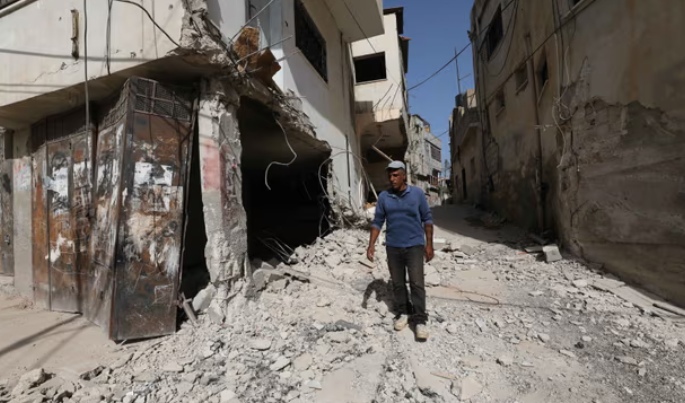Another massive Israeli army airstrike has killed members of the family of the head of Hamas, while the UN continues to warn of high levels of famine in the Gaza Strip.
The death of a Hamas leader’s family
An Israeli airstrike killed 10 members of Hamas chief Ismail Haniyeh’s family, Gaza’s civil defence agency said on Tuesday.
Mahmud Basal, a spokesman for Gaza’s civil defence, told AFP that several bodies were probably still under the rubble but “we don’t have the necessary equipment” to extract them. The bodies were transferred to Al-Ahli hospital in neighbouring Gaza City, Basal added.
Haniyeh, the political leader of Qatar-based Hamas, lost three sons and four grandchildren in an Israeli strike in April in central Gaza, and the military accused them of “terrorist activities”. Some 60 members of his family have reportedly been killed since the Palestinian militants’ war with Israel began on October 7.
The announcement came after Israeli Prime Minister Benjamin Netanyahu on Monday said Israel remained committed to its proposed Gaza ceasefire and hostage-taking agreement, and his military chief said the remaining Hamas forces in southern Gaza. Netanyahu said, speaking in parliament:
We are committed to the Israeli proposal that President Biden welcomed. Our position has not changed. The second thing, which does not contradict the first, is that we will not end the war until we destroy Hamas.
The Israeli military released a statement following an assessment of the situation by its chief of staff in the Rafah area, where Israeli troops are battling remaining Hamas battalions. Lieutenant General Herzi Halevi said:
We are clearly approaching the point where we can say that we have eliminated the Rafah Brigade, that it has been defeated, not in the sense that there are no more terrorists, but that it can no longer function as a fighting unit.
The threat of famine is growing in Gaza
Meanwhile, more than half of families in the Gaza Strip have been forced to sell or trade their clothes to be able to buy food, the UN said, as the risk of famine remains high across the territory following a new round of violence in recent weeks.
The latest Gaza Special Snapshot from the UN’s hunger monitoring system, the Integrated Food Security Phase Classification (IPC), to be released on Tuesday, said one in five Gazans – more than 495,000 people – are now “facing catastrophic levels of acute food insecurity” including “extreme food insecurity, hunger and exhaustion.”
The IPC noted that food supplies and nutritional services in northern Gaza had increased dramatically in March and April, which “probably prevented famine” there and improved conditions in the southern parts of the territory.
However, in recent weeks the situation “began to deteriorate again following the resumption of hostilities” and “a high risk of famine persists throughout the Gaza Strip as long as conflict continues and humanitarian access is limited”, according to the draft report obtained by the Guardian. The report said:
More than half [of households] also reported that, often, they do not have any food to eat in the house, and over 20% go entire days and nights without eating. The recent trajectory is negative and highly unstable. Should this continue, the improvements seen in April could be rapidly reversed.
The warning came despite months of US pressure on Israel for more aid efforts, the installation of a $230 million pier that has run into problems and repeated shipments of aircraft from various countries that aid agencies say are insufficient to meet vital needs.
Israel invaded Gaza after an October attack by Hamas in which Palestinian militants killed about 1,200 people, mostly civilians and kidnapped about 250. The war has killed more than 37,000 Palestinians, according to Gaza’s health ministry.
Efforts to resolve the conflict with the Lebanese group
Israel will spend the coming weeks trying to resolve the conflict with Lebanon’s Iran-backed group Hezbollah and would prefer a diplomatic solution, Israel’s national security adviser said on Tuesday.
National security adviser Tzachi Hanegbi said Israel had been discussing with US officials the possibility that an expected end of intense Israeli military operations in Gaza would allow an “arrangement” to be reached with Hezbollah.
Hezbollah says it aims to disrupt Israel’s operations in the Gaza Strip. Shelling on Israel’s northern border has led to the evacuation of tens of thousands of people from areas on both sides of the frontier, and has escalated in recent weeks, leading to fears of an all-out conflict. Hanegbi said at the Herzliya conference:
“We and the Americans believe and we will dedicate weeks now in an attempt to reach an arrangement. If there will not be an arrangement through diplomatic means, everyone understands that there must be an arrangement through other means. For now we prefer to focus on the diplomatic campaign.”
Hanegbi also said Israel was discussing with Washington a possible joint effort by the US, European and some Arab countries to find a replacement for Hamas rule in the Gaza Strip.
